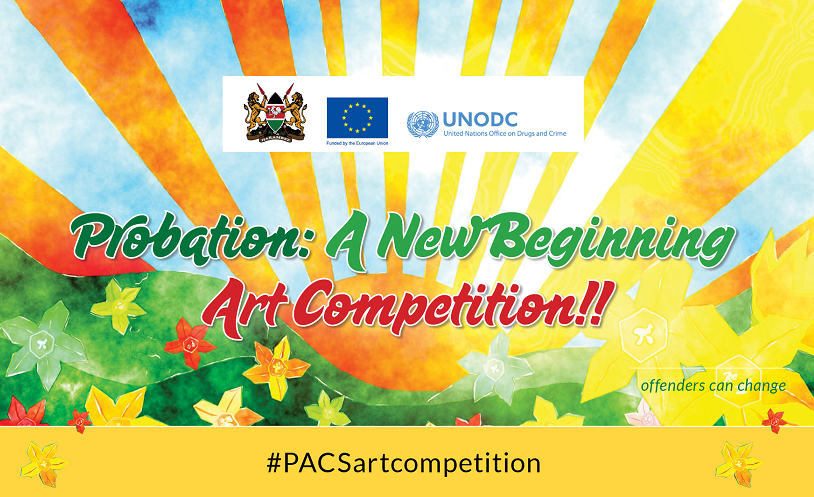UNODC Eastern Africa News and Stories
You are here: Home / News
Art competition to empower children in conflict with the law
 Nairobi, 20 August 2020 - An art competition to empower children who are on probation under the supervision of Kenya’s Probation and After Care Service (PACS) has been launched today.
Nairobi, 20 August 2020 - An art competition to empower children who are on probation under the supervision of Kenya’s Probation and After Care Service (PACS) has been launched today.
The young probationers, between 8 to 17 years, are encouraged to take part by creating paintings, drawings or collages that express their experiences in conflict with the law, lessons learnt and their hopes for the future.
The art project is a joint initiative of PACS, the Delegation of the European Union to Kenya and United Nations Office on Drugs and Crime (UNODC) and will culminate in a public exhibition later this year.
“It is not understatement to note that some of the children, because of circumstances beyond their control, have found themselves in conflict with the law. We’re aware of the effects of crime and specifically on children, which have far-reaching ramifications to themselves, their families and of course, the country,” the Senior Deputy Secretary, State Department for Correctional Services, Mrs Lina Too, said during the launch.
“One of the event aims is to enhance child participation as a fundamental right and provide a platform upon which children, hitherto invisible, can express their desires, aspirations and thoughts about crime and the juvenile justice system,” Mrs Too said.
The art competition, funded by the EU through a justice partnership called the Programme for Legal Empowerment and Aid Delivery in Kenya (PLEAD), also has an important awareness raising objective.
Probation has been part of Kenya’s justice system for over 70 years yet the concept of probation, the work of probation officers and the experiences of people who are on probation are not widely known.
“Every child deserves a second chance. Hence it is important to focus on bringing children back on the right track. Art can be a powerful tool in giving children hope and a perspective. The European Union is focusing in our partnership with Kenya on Youth. Therefore this initiative, supported through our PLEAD programme, is very pertinent,” European Union Delegation to Kenya, Mr Hubert Perr, said.
 A judging panel will look at each piece of art and also read a written description to be provided by each child that explains what is in their picture. There will be a first, second and third prize awarded in three age categories, and every child who enters will receive a certificate of participation.
A judging panel will look at each piece of art and also read a written description to be provided by each child that explains what is in their picture. There will be a first, second and third prize awarded in three age categories, and every child who enters will receive a certificate of participation.
“It is our hope this art project will provide an outlet for creative expression at a time when school and studies have been interrupted due to the COVID-19 pandemic. This initiative is also intended to enhance awareness of offender rehabilitation, improve understanding of what the Probation and After Care Service does, and the importance of giving young offenders a second chance so they can take their life on a new course,” UNODC Regional Representative for Eastern Africa, Dr Amado Philip de Andrés, said.
The closing date for the competition is 30 September, after which the judging will take place.
See also Speeches: Remarks at the launch by Dr. de Andres
Contacts
- Probation and After Care Service - Joy Riungu joy.riungu@probation.go.ke
- European Union - delegation-kenya-press@eeas.europa.eu
- UNODC - unodc-plead@un.org
See also Remarks by the UNODC Regional Representative
What is probation?
In the context of offender supervision, probation is an order made by a court of law requiring an offender to be under community supervision by a Probation Officer after being found guilty of an offence. It is also a means of rehabilitating offenders in the community as an alternative to imprisonment.
About the Probation and After Care Service (PACS)
PACS promotes and enhances the administration of justice, community safety and public protection through provision of social inquiry reports, supervision, rehabilitation and reintegration of non-custodial offenders, victim support and crime prevention. PACS manages a sizeable population of offenders serving their sentences in the community. Rehabilitation of children takes cognizance of their evolving capacities including talent recognition and participation. Expressive art is one of the ways in which young offenders not only learn a skill but also gives them an avenue to express their experiences of the juvenile justice system. See www.probation.go.ke